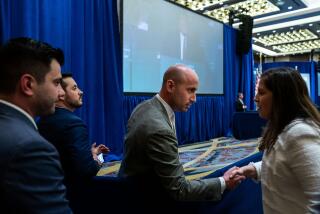Alternative Dispute Settlement Is Controversial : Workplace: It’s a boon to employers, but some force workers to agree to use company-run programs in resolving on-the-job differences.
- Share via
Employers are setting up in-house tribunals to resolve a variety of workplace disputes, especially wrongful termination cases, but the practice is sparking controversy as high up as Capitol Hill.
Motorola Inc., Marriott Corp. and Travelers Corp., hoping to avoid long and costly court battles, have established so-called alternative dispute resolution, or ADR, systems.
The systems also are being used to resolve disputes over performance ratings, grievances, and charges of racial bias and sexual harassment.
Employees who use them can get their cases heard in a matter of weeks--rather than the years it could take suing their employers in court.
ADRs succeed so well for employers that they “virtually eliminate excessive punitive damages (by juries) for reckless employer conduct,” said Martin Payson, a partner in the White Plains, N.Y., office of Jackson, Lewis, Schnitzler & Krupman.
His law firm has set up more than 20 such systems over the past few years.
At Coors Brewing Co., which has had a voluntary ADR since 1975, the system has worked well, said Mark Lacy, manager of employee relations. The 5,000 employees at the Golden, Colo., brewery use it about 100 times a year, he said.
A 1990 survey by Coors “indicated employees generally felt comfortable with it, used it and understood it,” he said.
Further, an internal study Lacy made in 1993 showed that 60% of the dismissals in during the previous five years were upheld by the ADR system, while only 5% were reversed.
The other 35% were altered in some way, “such as reinstatement with back pay,” he said.
Also, employees’ cases usually were resolved within six weeks, meaning Coors profited from “considerable savings” in legal fees, Lacy said.
But some companies are demanding that job applicants agree as a condition of being hired that they take any dispute to a company ADR rather than to court.
In Congress, Sen. Russ Feingold (D-Wis.) has introduced legislation against compulsory ADR systems.
“I strongly support the use of voluntary dispute resolution methods as a way to reduce court caseloads where appropriate,” Feingold said. “Some employers are telling applicants, ‘If you want to work for us, you’ll have to check your rights as an American citizen at the door.’
“If it’s a condition of employment,” he said, “I think it’s unconstitutional and should be banned.”
Under an ADR, employees state their case before a so-called peer panel, typically comprised of three co-workers and two managers, according to Payson. After each side testifies behind closed doors, a secret ballot is taken.
Because managers know their actions are subject to ADRs, they “make better decisions,” and thus the employer tends to win more often, Payson said. Also, in an ADR system, employees’ peers tend to vote nay because “they are less tolerant of unsatisfactory performance,” he said.
Lewis Maltby of the American Civil Liberties Union in New York said he too opposes compulsory ADRs and prefers arbitration.
“Employees win in arbitrations as much as employers, and it’s much quicker and cheaper,” he said.
When ADRs are compulsory, he asked, “How do you stop the employer from creating a private justice system in which the employee has as much chance as the Christians in the Colosseum?”
More to Read
Inside the business of entertainment
The Wide Shot brings you news, analysis and insights on everything from streaming wars to production — and what it all means for the future.
You may occasionally receive promotional content from the Los Angeles Times.









